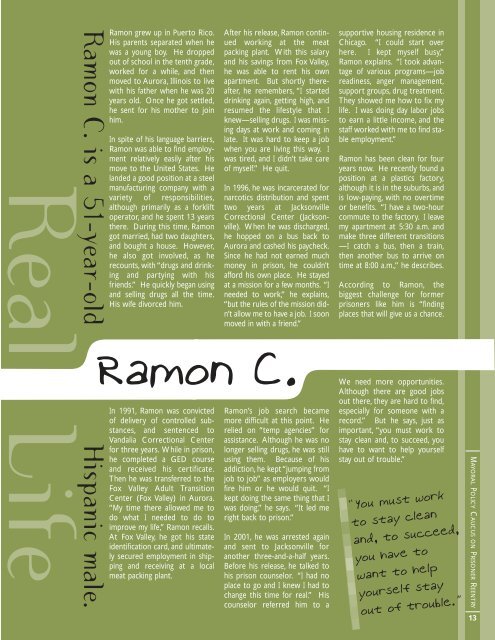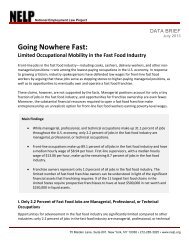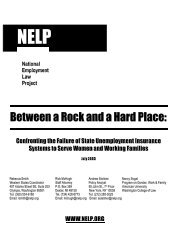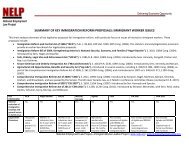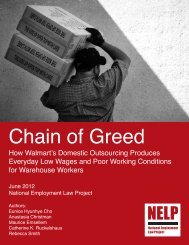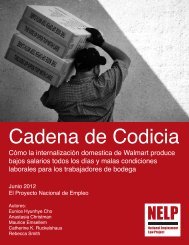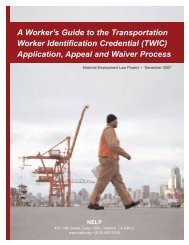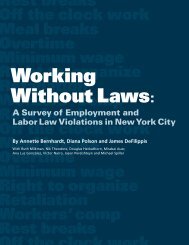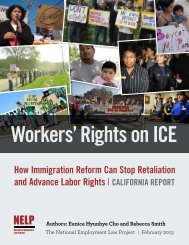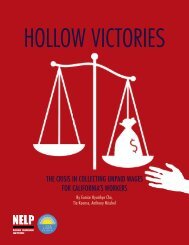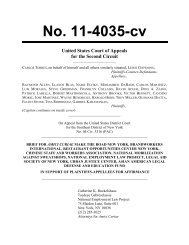Rebuilding Lives. Strengthening Communities.
Rebuilding Lives. Strengthening Communities.
Rebuilding Lives. Strengthening Communities.
You also want an ePaper? Increase the reach of your titles
YUMPU automatically turns print PDFs into web optimized ePapers that Google loves.
Ramon C. is a 51-year-old<br />
Real Life<br />
Ramon grew up in Puerto Rico.<br />
His parents separated when he<br />
was a young boy. He dropped<br />
out of school in the tenth grade,<br />
worked for a while, and then<br />
moved to Aurora, Illinois to live<br />
with his father when he was 20<br />
years old. Once he got settled,<br />
he sent for his mother to join<br />
him.<br />
In spite of his language barriers,<br />
Ramon was able to find employment<br />
relatively easily after his<br />
move to the United States. He<br />
landed a good position at a steel<br />
manufacturing company with a<br />
variety of responsibilities,<br />
although primarily as a forklift<br />
operator, and he spent 13 years<br />
there. During this time, Ramon<br />
got married, had two daughters,<br />
and bought a house. However,<br />
he also got involved, as he<br />
recounts, with “drugs and drinking<br />
and partying with his<br />
friends.” He quickly began using<br />
and selling drugs all the time.<br />
His wife divorced him.<br />
In 1991, Ramon was convicted<br />
of delivery of controlled substances,<br />
and sentenced to<br />
Vandalia Correctional Center<br />
for three years. While in prison,<br />
he completed a GED course<br />
and received his certificate.<br />
Then he was transferred to the<br />
Fox Valley Adult Transition<br />
Center (Fox Valley) in Aurora.<br />
“My time there allowed me to<br />
do what I needed to do to<br />
improve my life,” Ramon recalls.<br />
At Fox Valley, he got his state<br />
identification card, and ultimately<br />
secured employment in shipping<br />
and receiving at a local<br />
meat packing plant.<br />
After his release, Ramon continued<br />
working at the meat<br />
packing plant. With this salary<br />
and his savings from Fox Valley,<br />
he was able to rent his own<br />
apartment. But shortly thereafter,<br />
he remembers, “I started<br />
drinking again, getting high, and<br />
resumed the lifestyle that I<br />
knew—selling drugs. I was missing<br />
days at work and coming in<br />
late. It was hard to keep a job<br />
when you are living this way. I<br />
was tired, and I didn’t take care<br />
of myself.” He quit.<br />
In 1996, he was incarcerated for<br />
narcotics distribution and spent<br />
two years at Jacksonville<br />
Correctional Center (Jacksonville).<br />
When he was discharged,<br />
he hopped on a bus back to<br />
Aurora and cashed his paycheck.<br />
Since he had not earned much<br />
money in prison, he couldn’t<br />
afford his own place. He stayed<br />
at a mission for a few months. “I<br />
needed to work,” he explains,<br />
“but the rules of the mission didn’t<br />
allow me to have a job. I soon<br />
moved in with a friend.”<br />
Ramon C.<br />
Hispanic male.<br />
Ramon’s job search became<br />
more difficult at this point. He<br />
relied on “temp agencies” for<br />
assistance. Although he was no<br />
longer selling drugs, he was still<br />
using them. Because of his<br />
addiction, he kept “jumping from<br />
job to job” as employers would<br />
fire him or he would quit. “I<br />
kept doing the same thing that I<br />
was doing,” he says. “It led me<br />
right back to prison.”<br />
In 2001, he was arrested again<br />
and sent to Jacksonville for<br />
another three-and-a-half years.<br />
Before his release, he talked to<br />
his prison counselor. “I had no<br />
place to go and I knew I had to<br />
change this time for real.” His<br />
counselor referred him to a<br />
supportive housing residence in<br />
Chicago. “I could start over<br />
here. I kept myself busy,”<br />
Ramon explains. “I took advantage<br />
of various programs—job<br />
readiness, anger management,<br />
support groups, drug treatment.<br />
They showed me how to fix my<br />
life. I was doing day labor jobs<br />
to earn a little income, and the<br />
staff worked with me to find stable<br />
employment.”<br />
Ramon has been clean for four<br />
years now. He recently found a<br />
position at a plastics factory,<br />
although it is in the suburbs, and<br />
is low-paying, with no overtime<br />
or benefits. “I have a two-hour<br />
commute to the factory. I leave<br />
my apartment at 5:30 a.m. and<br />
make three different transitions<br />
—I catch a bus, then a train,<br />
then another bus to arrive on<br />
time at 8:00 a.m.,” he describes.<br />
According to Ramon, the<br />
biggest challenge for former<br />
prisoners like him is “finding<br />
places that will give us a chance.<br />
We need more opportunities.<br />
Although there are good jobs<br />
out there, they are hard to find,<br />
especially for someone with a<br />
record.” But he says, just as<br />
important, “you must work to<br />
stay clean and, to succeed, you<br />
have to want to help yourself<br />
stay out of trouble.”<br />
“You must work<br />
to stay clean<br />
and, to succeed,<br />
you have to<br />
want to help<br />
yourself stay<br />
out of trouble.”<br />
MAYORAL POLICY CAUCUS ON PRISONER REENTRY<br />
13


